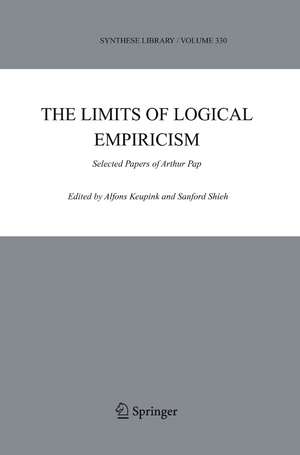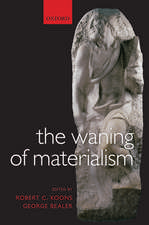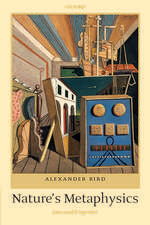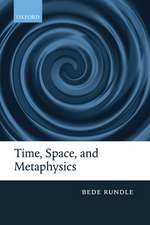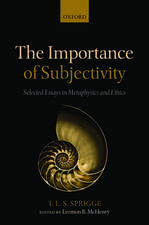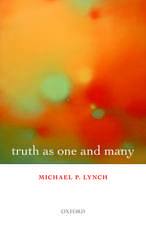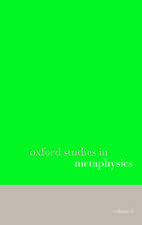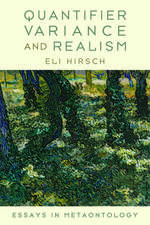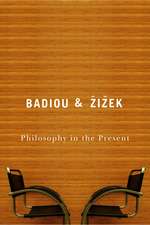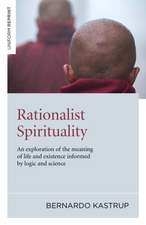The Limits of Logical Empiricism: Selected Papers of Arthur Pap: Synthese Library, cartea 334
Editat de Alfons Keupink, Sanford Shiehen Limba Engleză Hardback – 2 mar 2006
| Toate formatele și edițiile | Preț | Express |
|---|---|---|
| Paperback (1) | 1222.80 lei 6-8 săpt. | |
| SPRINGER NETHERLANDS – 30 noi 2010 | 1222.80 lei 6-8 săpt. | |
| Hardback (1) | 1230.66 lei 6-8 săpt. | |
| SPRINGER NETHERLANDS – 2 mar 2006 | 1230.66 lei 6-8 săpt. |
Din seria Synthese Library
- 15%
 Preț: 638.43 lei
Preț: 638.43 lei - 18%
 Preț: 989.98 lei
Preț: 989.98 lei - 15%
 Preț: 596.69 lei
Preț: 596.69 lei - 18%
 Preț: 903.93 lei
Preț: 903.93 lei - 15%
 Preț: 586.88 lei
Preț: 586.88 lei - 15%
 Preț: 696.50 lei
Preț: 696.50 lei - 18%
 Preț: 892.90 lei
Preț: 892.90 lei - 15%
 Preț: 643.34 lei
Preț: 643.34 lei -
 Preț: 282.33 lei
Preț: 282.33 lei - 5%
 Preț: 372.19 lei
Preț: 372.19 lei -
 Preț: 443.10 lei
Preț: 443.10 lei - 15%
 Preț: 637.59 lei
Preț: 637.59 lei - 18%
 Preț: 958.88 lei
Preț: 958.88 lei - 15%
 Preț: 642.36 lei
Preț: 642.36 lei - 18%
 Preț: 1230.66 lei
Preț: 1230.66 lei - 15%
 Preț: 642.83 lei
Preț: 642.83 lei - 18%
 Preț: 1000.39 lei
Preț: 1000.39 lei -
 Preț: 389.70 lei
Preț: 389.70 lei - 15%
 Preț: 637.28 lei
Preț: 637.28 lei - 18%
 Preț: 952.26 lei
Preț: 952.26 lei - 18%
 Preț: 1231.32 lei
Preț: 1231.32 lei - 15%
 Preț: 645.96 lei
Preț: 645.96 lei -
 Preț: 395.85 lei
Preț: 395.85 lei -
 Preț: 400.47 lei
Preț: 400.47 lei - 18%
 Preț: 1225.48 lei
Preț: 1225.48 lei - 15%
 Preț: 638.89 lei
Preț: 638.89 lei - 18%
 Preț: 1232.09 lei
Preț: 1232.09 lei -
 Preț: 380.45 lei
Preț: 380.45 lei -
 Preț: 394.87 lei
Preț: 394.87 lei - 15%
 Preț: 640.37 lei
Preț: 640.37 lei - 15%
 Preț: 639.08 lei
Preț: 639.08 lei -
 Preț: 381.98 lei
Preț: 381.98 lei - 15%
 Preț: 643.00 lei
Preț: 643.00 lei - 15%
 Preț: 672.29 lei
Preț: 672.29 lei
Preț: 1230.66 lei
Preț vechi: 1500.81 lei
-18% Nou
Puncte Express: 1846
Preț estimativ în valută:
235.50€ • 243.32$ • 195.90£
235.50€ • 243.32$ • 195.90£
Carte tipărită la comandă
Livrare economică 19 martie-02 aprilie
Preluare comenzi: 021 569.72.76
Specificații
ISBN-13: 9781402042980
ISBN-10: 1402042981
Pagini: 394
Ilustrații: XIII, 394 p.
Dimensiuni: 155 x 235 x 28 mm
Greutate: 0.82 kg
Ediția:2006
Editura: SPRINGER NETHERLANDS
Colecția Springer
Seria Synthese Library
Locul publicării:Dordrecht, Netherlands
ISBN-10: 1402042981
Pagini: 394
Ilustrații: XIII, 394 p.
Dimensiuni: 155 x 235 x 28 mm
Greutate: 0.82 kg
Ediția:2006
Editura: SPRINGER NETHERLANDS
Colecția Springer
Seria Synthese Library
Locul publicării:Dordrecht, Netherlands
Public țintă
ResearchCuprins
Preface.- Acknowledgments.- Part I Themes in Pap’s Philosophical Writings.- Introduction; S. Shieh.- 1. Overview of Pap’s Philosophical Work.- 2. Necessity as Analyticity.- 3. Necessity as (Implicit) Linguistic Convention.- 4. The Analytic-Synthetic Distinction: Hypothetical or Functional Necessity.- 5. The Analytic-Synthetic Distinction: Dispositional and Open Concepts.- 6. The Limits of Hypothetical Necessity: Formal or Absolute Necessity.- 7. Logical Consequence and Material Entailment.- 8. The Method of Conceivability.- 9. Comparison with Necessity in Contemporary Analytic Metaphysics.- 10. Logicism.- 11. Concluding Remarks.- Part II Analyticity, A Priority and Necessity.- 1. On the Meaning of Necessity (1943). 2. The Different Kinds of A Priori (1944).- 3. Logic and the Synthetic A Priori (1949).- 4. Are all Necessary Propositions Analytic? (1949).- 5. Necessary Propositions and Linguistic Rules (1955).- 5.1. Are there Necessary Propositions?.- 5.2. The Confusion of Sentence and Proposition.- 5.3. Are Propositions "Logical Constructions"?.- 5.4. Necessary Truth and Semantic Systems.- 5.5. Implicit Definitions.- Part III Semantic Analysis: Truth, Propositions, and Realism.- 6. The "Semantic" and the "Absolute" Concepts of Truth (1952).- Appendix: Rejoinder to Mrs. Robbins (1953).- 7. Propositions, Sentences, and the Semantic Definition of Truth (1954).- 8. Belief and Propositions (1957).- 9. Semantic Examination of Realism (1947).- 9.1. Universals in Re and the Resemblance Theory.- 9.2. Platonism and the Existence of Universals.- Part IV Philosophy of Logic and Mathematics.- 10. Logic and the Concept of Entailment (1950).- 11. Strict Implication, Entailment, and Modal Iteration (1955).- 12. Mathematics, Abstract Entities, and Modern Semantics (1957).- 12.1. Traditional Problem of Universals.- 12.2. Modem Semantics and the Traditional Dispute.- 12.3. Classes, Attributes, and the Logical Analysis of Mathematics.- 12.4. What do the OntologicalQuestions Mean?.- 13. Extensionality, Attributes, and Classes (1958).- 14. A Note on Logic and Existence (1947).- 15. The Linguistic Hierarchy and the Vicious-Circle Principle (1954).- Part V Philosophy of Mind.- 16. Other Minds and the Principle of Verifiability (1951).- 16.1. Verifiability as Generator of Philosophical Theories.- 16.2. The Behaviorist’s Confusion about the Notion of Verifiability.- 16.3. Are Statements about Other Minds Conclusively Verifiable?.- 16.4. Physicalism as an Analytic Thesis.- 17. Semantic Analysis and Psycho-Physical Dualism (1952).- Part VI Philosophy of Science.- 18. The Concept of Absolute Emergence (1951).- 19. Reduction Sentences and Open Concepts (1953).- Appendix.- 20. Extensional Logic and Laws of Nature (1955).- 21. Disposition Concepts and Extensional Logic (1958).- 22. Are Physical Magnitudes Operationally Definable? (1959).- 22.1. Operational Definition as Contextual Definition.- 22.2. Operational Definition in the Form of Reduction Sentences.- 22.3. Physical Magnitudes and the Language of Observables.- 22.4. Theoretical Definition and Partial Interpretation.- 22.5. The Breakdown of the Analytic-Synthetic Distinction.- Part VII Arthur Pap’s Life and Writings.- 23. Intellectual Biography of Arthur Pap; A. Keupink.- 24. Arthur Pap: Biographical Notes; P. Pap.- 25. A Bibliography of Arthur Pap; A. Keupink.- 25.1. Main Publications.- 25.2. Editions.- 25.3. Translations.- 25.4. Articles, Papers and Reviews.- References.- Index.
Textul de pe ultima copertă
This volume brings together a selection of the most philosophically significant papers of Arthur Pap. As Sanford Shieh explains in the Introduction to this volume, Pap’s work played an important role in the development of the analytic tradition. This role goes beyond the merely historical fact that Pap’s views of dispositional and modal concepts were influential. As a sympathetic critic of logical empiricism, Pap, like Quine, saw a deep tension in logical empiricism at its very best, in the work of Carnap. But Pap’s critique of Carnap is quite different from Quine’s, and represents the discovery of limits beyond which empiricism cannot go, where there lies nothing other than intuitive knowledge of logic itself. Pap’s arguments for this intuitive knowledge anticipate Etchemendy’s recent critique of the model-theoretic account of logical consequence. Pap’s work also anticipates prominent developments in the contemporary neo-Fregean philosophy of mathematics championed by Wright and Hale. Finally, Pap’s major philosophical preoccupation, the concepts of necessity and possibility, provides distinctive solutions and perspectives on issues of contemporary concern in the metaphysics of modality. In particular, Pap’s account of modality allows us to see the significance of Kripke’s well-known arguments on necessity and apriority in a new light.
This volume will be of interest to all researchers in the philosophical history of the analytic tradition, in philosophy of logic, philosophy of mathematics, and contemporary analytic metaphysics.
This volume will be of interest to all researchers in the philosophical history of the analytic tradition, in philosophy of logic, philosophy of mathematics, and contemporary analytic metaphysics.
Caracteristici
Demonstrates the importance of Pap's work for the development of analytic philosophy of science Illustrates how Pap's work was the central reference on modality in analytic philosophy before Kripke Pap's writings in philosophy of science, modality, and philosophy of mathematics provide insightful alternative perspectives on philosophical problems of current interest
